it a joke.
You are using an out of date browser. It may not display this or other websites correctly.
You should upgrade or use an alternative browser.
You should upgrade or use an alternative browser.
Coronavirus Pandemic: Apocalypse Now! Or exaggerated scare story?
- Thread starter wanderingthomas
- Start date
bianca etezete
Dagobah Resident
Hahaha, I first thought Macron, but then he looked so old... lol, didn't catch the joke at first, but this is really funny!It's a joke, a Photoshopped picture of the president, Emmanuel Macron, as if it was in the future. See here:
(Meaning that we'll be confined till then.)
No problem, it is a good joke.in a joke, i m talking to her, sorry

Fox News just said a famous playwright has died from complications from COVID - he was 81. 
More regarding unsanitary conditions:

More regarding unsanitary conditions:
What we can learn from past pandemics
Epidemics, plagues, and pandemics have been around since the dawn of civilization. Indeed, they are an unintended consequence of civilization. Disease certainly afflicted our prehistoric ancestors, but since the earliest humans lived in small isolated bands, they had limited opportunity to share germs beyond their own community. That situation changed dramatically when the agricultural revolution replaced a nomadic with a sedentary lifestyle 10,000 years ago.
Once humans began to live in villages, towns, and especially cities, they had to contend with contagious diseases on a larger scale. They have been doing so ever since. For much of history, urban dwellers lived in crowded, unsanitary conditions.
[...]
The Venetians banned sailors from entering their cities for 30 days, which they later extended to 40. The Italian “quaranta giorni” (literally, “40 days”) became the English “quarantine.” In some towns, officials literally sealed infected people into their houses, a harsh precursor to current admonitions to “work from” home. While quarantines may have helped deter the spread of plague, the wholesale slaughter of cats proved counterproductive in trying to stop a disease spread by rats. [Why the slaughter of cats - suspected of carrying/spreading the disease? Still blaming rats - more disinformation also in article]

What we can learn from past pandemics
History does not repeat itself, but it can help us understand the present and prepare for the future. The pandemics of the past offer valuable lessons.thehill.com
bianca etezete
Dagobah Resident
thank you for bringing up this article. It made me think. The Virus of the Time has also the power to make certain themes of the past, those of which we should learn, go viral. I have the feeling that more and more people are ready at least to start the search. Being curious, look how they dealt with crisis in the past. Be aware of the consequences of ones doings. in every direction, without loosing focus on what is important to learn. THAT is truely a wonderful thing I think is actually happening right now.Fox News just said a famous playwright has died from complications from COVID - he was 81.
More regarding unsanitary conditions:
More from previously referenced article:
Wondering if this is intentional or unintentional truth telling? The other infecting virus at work?In some cities, trucks and carts drove down streets calling on people to “bring out their dead,” who were then buried in mass graves. Some victims, especially children, died of neglect and even starvation, as no one would enter infected houses to care for them. During a pandemic, fear can be as much of a problem as the disease itself.
History does not repeat itself, but it can help us understand the present and prepare for the future. The pandemics of the past offer valuable lessons. First, in all probability COVID-19 will not come close to the severity of any of the great pandemics.
We have far more knowledge and resources to prevent infection and treat this disease than did our great grandparents in 1918. Second, fear continues to be as contagious and debilitating as the disease itself. Considerable evidence suggests that COVID-19 is not particularly lethal to healthy people under 60.
Unfortunately, this fact has not prevented the hoarding of masks and hand sanitizer. Whether current anxiety develops into a full-blown panic depends on whether the federal government has learned the final lesson of past pandemics: withholding information, distorting facts, and downplaying the threat always makes matters worse.
In a crisis, people must be able to trust their leaders. Trust can be earned and maintained only when those leaders provide clear, accurate and timely information.
Tom Mockaitis is a professor of History at DePaul University where he teaches World Civilizations. His most recent book is, "Violent Extremism: Understanding the Domestic and International Terrorist Threat."

What we can learn from past pandemics
History does not repeat itself, but it can help us understand the present and prepare for the future. The pandemics of the past offer valuable lessons.thehill.com
Here in the Netherlands everything goes quite smoothly.
Had just gone to the supermarket in the evening, and there was still a lot of bread.
Even my favorite one with sesame seeds on the crust,
It's great to hear more from Dutch members @Jasophoria and @sevensama
 A note on bread, though! Do check out the following thread if you're interested: "Life Without Bread". Also, on Sott.net when you type in the search bar: intitle: gluten , you will find articles on the negative effects of gluten (which is in wheat bread) on our health. The C's have said that not only psychic hygiene is important, but also a good diet! A lot of research has been done on the forum (and we have some experts in this field) regarding this and you can find the latest findings and the diet we think is most helpful in the Diet and Health section (there's no one size fits all, though, so if you have any questions regarding this, you can always ask in one of the threads in that section). Thought I'd share in case you're interested in the topic
A note on bread, though! Do check out the following thread if you're interested: "Life Without Bread". Also, on Sott.net when you type in the search bar: intitle: gluten , you will find articles on the negative effects of gluten (which is in wheat bread) on our health. The C's have said that not only psychic hygiene is important, but also a good diet! A lot of research has been done on the forum (and we have some experts in this field) regarding this and you can find the latest findings and the diet we think is most helpful in the Diet and Health section (there's no one size fits all, though, so if you have any questions regarding this, you can always ask in one of the threads in that section). Thought I'd share in case you're interested in the topic 
Peter R. is a topic of his own... that man raises some serious red flags usually (his connections to the amsterdam underground - crying at the funeral of his top criminal friend cor van hout?).
Yeah, and he's a bit of a liberal/lefty type of person. So this was kind of surprising, but good to see.
... and then more public outcry where citizens are going to ask the government for a lockdown, maybe?
Maybe, but hopefully that won't happen!
Adaryn
The Living Force
Sorry if this has been mentioned before (haven't caught up with the latest posts): Pr Raoult - who has receveid many threats and has been relentlessly slammed by the media and the medical establishment - has quitted the scientific committee set up by Macron to deal with the Covid:
He's currently testing and treating hundreds of patients with chloroquine in his Marseille hospital.
This is already happening. Dozens of people have already died in French nursing homes, "possibly of Covid-19" (so say the MSM). Me thinks a lot of them are just giving up on life, deprived as they are of any physical contact and proper nurturing, surrounded by highly stressed caregivers and nurses who communicate with them through masks, and not being able to see or talk to their family. It's just too much.
Disagreeing for weeks with the containment policy he calls "medieval", he has been hammering home the need for nationwide mass screening to detect suspicious cases, isolate and treat positive patients. As in South Korea: the country reported on Monday the lowest number of new daily cases of coronavirus contamination since the end of February and is now fuelling hopes that the epidemic is under control.
He's currently testing and treating hundreds of patients with chloroquine in his Marseille hospital.
luc said:Dr. Wordarg's work, questions the numbers, knows about how the Italians count their deaths and why this matters, pities the elderly who might sooner die from isolation than from the virus
This is already happening. Dozens of people have already died in French nursing homes, "possibly of Covid-19" (so say the MSM). Me thinks a lot of them are just giving up on life, deprived as they are of any physical contact and proper nurturing, surrounded by highly stressed caregivers and nurses who communicate with them through masks, and not being able to see or talk to their family. It's just too much.
Very interesting indeed. As it turns out it actually happened that way as you can see here. What is even more interesting is what happened before that point starting at 53:20 (and later in it) in the video. Trump is calling out Pompeo to stand in front of the press and explain himself pointing out that the state department is the deep state department referring directly to Pompeo. Trump definitely pushed Pompeo here to take the heat of what he is been up to. I encourage you to watch the whole thing from that point on, it is very revealing...
Here is the snipped again:
There's not much to see here IMO. At the beginning, Trump is obviously joking when he refers to the state dept. as the "deep state dept". then later when Pompeo is speaking and Trump says "they should've let us know", it's pretty clear he is referring to China, given that Pompeo was saying that China had the virus first, they had the information, we needed that information for our scientists etc (that's when Trump chimes in and says "they should've let us know". So let's not get distracted by this.
I had a surprising experience today. A client called me for some project, and after we finished we chatted a bit about the situation. Little by little, each of us revealed a bit of skepticism, we kind of "circled" around each other. At the end of the chat, turns out that she is familiar with Dr. Wordarg's work, questions the numbers, knows about how the Italians count their deaths and why this matters, pities the elderly who might sooner die from isolation than from the virus, says all this is overblown and that the real concern is the economy, and that a friend of hers who is a doctor just shakes her head in disbelief about all that. Whew!! Another friend of ours, a lawyer, also told us he thinks the whole thing is totally overblown. This gives me hope!I've been thinking about this recently. Without trying to make a too simplistic analysis, beyond the small particularities of each case, I have noticed two different profiles of individuals within the group of those who approve draconian measures:
1- Those who are mostly scared, who believe without questioning what their governments and the media say and who basically believe that they or their loved ones may die tomorrow, but who at the same time seek to adapt with some dignity to the new rules and are mostly concerned with taking care of their families by following all the rules.
2- Those who, besides being afraid and believing everything they hear, feel an imperative need to play an active role, to take the lead and be part of the police and control apparatus that the States are constructing. They are very active in neighbourhood groups making furious calls for EVERYONE to respect the rules, insulting (and encouraging others to do so) anyone who threatens isolation or questions it even minimally. Many of these also spend hours monitoring any movement in their neighborhoods and reporting anything "suspicious" to the authorities.
I think a good part of group 1 has the potential to "make the journey towards disillusionment and deprogramming". On the other hand, those in group 2 seem more likely to polarize towards the opposite end and be willing to defend their "small totalitarian world" along with the "big one".
For this reason I think it is important to know how to distinguish between individuals who belong to one group or another; with the former we can be a little more open by making them question the wisdom of everything that is happening, not seeking to confront but to open a channel of questions that will eventually lead them to rethink everything they believe when the time is right. With the second group, the best I can think of is to reinforce our strategic enclosure, not to seek any kind of direct confrontation and to go as far as possible unnoticed by them... They are now in a better position than we are, so a strategic withdrawal might be the best option at this time.
A little more on this subject.
I'm re-reading "Defying Hitler" again and I got to the part in chapter 11 where Haffner talks about a very little documented phenomenon that took place in Germany from 1924, when the economy stabilized and a period of peace and some prosperity began.
According to Haffner, a significant sector of the population was lost in terms of how to deal with the possibility of living a quiet life and developing the personal and private aspects of self-realization. Countless people who were accustomed to filling their lives with the constant excitement from internal political/economic/social conflicts resulting from post-war misery, suddenly found themselves standing on a void where the possibility of building a life of their own, of living joys and frustrations emanating exclusively from their private lives, was not an option. These people were like addicts to chaos, to conflict, to the intense emotion of fighting for survival. They were incapable of building something great from an ordinary private life, of enjoying it and making it interesting. These people did not receive the end of political tension and the return to a quiet and free life as a gift, but as a deprivation, as if something vital had been taken away from them.
Haffner makes it clear that not all Germans reacted in this way. There were some who, during this period, learned how to live. They began to live their own lives free from the daily intoxication of war and the constant threat of revolution.
According to Haffner, it was at this time that, in an invisible way and without anyone noticing, the Germans were divided between those who would later become Nazis and those who would remain non-Nazis.
I think that in this passage of the book there is something relevant to the times we are lining in. I have the feeling that many of these "little Nazis" who are appearing as a result of the total lockdown that is being imposed all over the world, have this same, let me call it "syndrome": the inability to create something extraordinary from their inner world and to build a life that is worth living based on personal development, caring for the family, and to make their lives interesting from the little experiences that private life offers. I think that these kind of people find a purpose for their lives from interfering in the lives of others and exercising control over them.
Well, this was just some thoughts that came to my mind...
I took a friend to the biggest clinic close to our town today, and took some pictures. Sorry, they aren't great, but I was trying not to get caught!
This is a clinic with more than 300 beds, and approx. 77,000 patients per year. Usually they cannot give individual rooms even when requested, and they take people out of the ICU asap, because they don't have enough beds. They SHOULD be saturated now, yes?
The parking lot is usually packed, no room to park before driving around for 10 minutes. See the back today:

Usually you either don't see nurses, or they are running around super busy. Today:

The male nurse was smoking, what a horror!

The welcoming tent, outside. An incompetent woman was asking people who they had an appointment with, and after 10 minutes, she managed to contact the right service to announce that my friend was there for his appointment. She told me I couldn't accompany my friend even though he needed help, and had to stay outside. She handed him a small yellow piece of paper with nothing written on it:
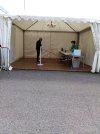
With that precious paper, we then went to the guard, who kindly took it (we had seen the entrance lady and were approve, bravo!), and he let me in, no problem, no questions asked. It seems that they aren't all on board with the rules...
We are only allowed to enter the clinic through the emergency room, all other entrances are closed. And this is what it looked like. Usually it's full, with people standing outside.

We finally made it to the radiotherapy waiting room, which is nicely decorated with medical tape, so that people sit far away from each other. Social distancing. Notice too the busy nurses at the back, getting coffee and playing with their phones.
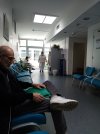
Visitors strictly forbidden on every floor.
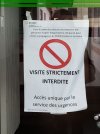
And THEN, on the pneumology floor, several rooms were empty or with a patient and the door open. BUT CAREFUL, this is terrible, ONE door in the entire floor had what (I assume) was a Corona sign: "Before entering please go to the nurse's office". I guess that's for the cleaners and the people who distribute lunch, since nobody is allowed to visit. I could have opened the door had I wanted to. Zero risk, probably.

And the signs in the waiting room: only one ambulance driver can accompany the patient, and they must not stay in the waiting room unless the patient is on a bed. No relatives/friends allowed (but they let me in without checking), one person can sit every two seats.
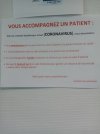
The main hall, usually packed as well.
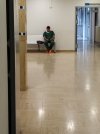
Now I believe it, it's a real epidemic, OMG!!!

I have to stay, all the staff seemed really nice today. They are on paid holidays! But in the meantime, like Gaby explained, people who SHOULD be there getting their treatments are refused, their appointments cancelled in order to avoid contagion. It seems that only patients receiving treatments for cancer are allowed, and a few rare others. Granted, we didn't go to the ICU, but I don't believe for a minute that it was full, or else, they'd be asking all the staff for help, there would have been more activity, and beds taken on other floors. What a farse this is...
This is a clinic with more than 300 beds, and approx. 77,000 patients per year. Usually they cannot give individual rooms even when requested, and they take people out of the ICU asap, because they don't have enough beds. They SHOULD be saturated now, yes?
The parking lot is usually packed, no room to park before driving around for 10 minutes. See the back today:

Usually you either don't see nurses, or they are running around super busy. Today:

The male nurse was smoking, what a horror!

The welcoming tent, outside. An incompetent woman was asking people who they had an appointment with, and after 10 minutes, she managed to contact the right service to announce that my friend was there for his appointment. She told me I couldn't accompany my friend even though he needed help, and had to stay outside. She handed him a small yellow piece of paper with nothing written on it:

With that precious paper, we then went to the guard, who kindly took it (we had seen the entrance lady and were approve, bravo!), and he let me in, no problem, no questions asked. It seems that they aren't all on board with the rules...
We are only allowed to enter the clinic through the emergency room, all other entrances are closed. And this is what it looked like. Usually it's full, with people standing outside.

We finally made it to the radiotherapy waiting room, which is nicely decorated with medical tape, so that people sit far away from each other. Social distancing. Notice too the busy nurses at the back, getting coffee and playing with their phones.

Visitors strictly forbidden on every floor.

And THEN, on the pneumology floor, several rooms were empty or with a patient and the door open. BUT CAREFUL, this is terrible, ONE door in the entire floor had what (I assume) was a Corona sign: "Before entering please go to the nurse's office". I guess that's for the cleaners and the people who distribute lunch, since nobody is allowed to visit. I could have opened the door had I wanted to. Zero risk, probably.

And the signs in the waiting room: only one ambulance driver can accompany the patient, and they must not stay in the waiting room unless the patient is on a bed. No relatives/friends allowed (but they let me in without checking), one person can sit every two seats.

The main hall, usually packed as well.

Now I believe it, it's a real epidemic, OMG!!!


I have to stay, all the staff seemed really nice today. They are on paid holidays! But in the meantime, like Gaby explained, people who SHOULD be there getting their treatments are refused, their appointments cancelled in order to avoid contagion. It seems that only patients receiving treatments for cancer are allowed, and a few rare others. Granted, we didn't go to the ICU, but I don't believe for a minute that it was full, or else, they'd be asking all the staff for help, there would have been more activity, and beds taken on other floors. What a farse this is...
Ok I M really sorry for posting this, it s just that I wasn't expecting my sister to joke about the virus, she is alone in quarantine in her appartement in Paris. She is afraid to go out because every year she get the flu and always end-up in bronchitis. Her son William who is a medic and use to work at Salté Priere Hospital in Paris in intensif care but left a year or so ago for another employer, phone them back to tell them that he was ready to go back if they needed him. He start tomorrow, will get is training for the corona virus. William was the first,first responder to arrive at the Bataclan, it a block away from where my sister lived, he was in charge of the respond team, received a medal from the president for it and another one from the firefighter, for whom he worked as a benevol for ten years. My sister is afraid, she follow the news and believe what they say so it difficult situation, I can only encourage her and telling that it will pass. Anyway, I got to go super is ready.
I shouldn't have posted my pseudoscience, sorry for that, it was a bad guess! However, I don't understand why you are making a "joke" about me being a member of the Gestapo, it's neither funny, nor cool.do you think cassandra is part of said gestapo? Just joking. I just wanted to explain why her line of thinking was wrong and give a reference.
I do however take your point, and I may have expressed myself badly, but I dislike your tone.
bianca etezete
Dagobah Resident
Oh, I am sorry,
I think you got that wrong. I didn't make fun of you of course. it was on JEEPs reply, that i picked up the Gestapo. So don't worry. I am sorry when my wording is clumsy, I am no english native speaker, I am german.I shouldn't have posted my pseudoscience, sorry for that, it was a bad guess! However, I don't understand why you are making a "joke" about me being a member of the Gestapo, it's neither funny, nor cool.
I do however take your point, and I may have expressed myself badly, but I dislike your tone.
Trending content
-
-
Thread 'Coronavirus Pandemic: Apocalypse Now! Or exaggerated scare story?'
- wanderingthomas
Replies: 30K -
-
